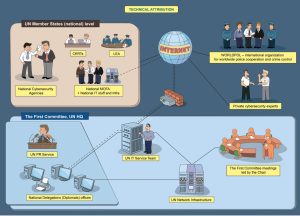
Technical Attribution in Cyberspace: Kaspersky offers simulation training for diplomats and non-technical cyber experts. An otherwise complicated safety training is conveyed via an online simulation game.
With the support of the non-profit educational foundation DiploFoundation, Kaspersky has developed an online simulation game that gives diplomats and cyber professionals without a technical background an understanding of cyber attacks. Kaspersky Interactive Protection Simulation (KIPS): technical attribution aims to provide cyber professionals with knowledge about the complexity of technical attribution.
Kaspersky Interactive Protection Simulation (KIPS)
In order to ensure cyber stability, a solid understanding and knowledge of prevention, assessment and reaction to risks and threats is essential for non-technical personnel and diplomats who are actively committed to peace and stability in the world. In particular, the private sector and the technical community can support governments and international organizations with the necessary technical attribution, such as the technical analysis of cyber incidents or events, in order to cluster attacks in groups and assign them to possible threat actors.
Simulation of cyber attacks on the United Nations
With the help of the security training Kaspersky Interactive Protection Simulation (KIPS): technical attribution developed by Kaspersky and DiploFoundation - which is based on Kaspersky Interactive Protection Simulation [3] and contains a specially developed fictitious environment that simulates cyber attacks on the United Nations - diplomats and everyone It makes it easier for non-technical cyber experts to learn the fundamentals and complexities of technical attribution. The aim of the game is to gather all the evidence and technical information necessary to answer as many questions as possible. This includes, among other things, what or who the intended target is, which techniques have been used, how serious an incident is and who is behind the simulated attack.
Participants play roles as training
Each participant plays the role of a diplomat in a fictional world where there has been an attack on the United Nations' "First Committee" that deals with issues of international security and peace, including in cyberspace. As the simulation progresses, players use action cards to make decisions that either lead to the most accurate technical analysis of the attack and help collect pieces of the evidence puzzle, or lead to greater uncertainty and cyber instability if the puzzle could not be solved .
"The global and diverse community of cyber professionals involved in cyber diplomacy issues typically have non-technical backgrounds," said Anastasiya Kazakova, Senior Public Affairs Manager at Kaspersky. “At the same time, they are asking how a safe, stable and peaceful information and communications technology environment can be achieved through increased international cooperation and multi-stakeholder engagement. Driven by the same goals, we have teamed up with the DiploFoundation to support diplomats and all cyber professionals with knowledge of the complexities of technical attribution realized in an unusual but highly interactive way through a kind of detective learning exercise. We have tested the game with real cyber diplomats, legal and political experts and have already received positive feedback. This shows that, through joint efforts in building cyber capacities, we can achieve cyber stability.”
Lack of understanding as a potential danger

In the game, the attribution process, i.e. cause, effect, background, etc. should be more understandable (Image: Kaspersky)
Vladimir Radunović, Director of Cybersecurity and e-Diplomacy at DiploFoundation, adds: “The terms 'cyber' and 'digital' are not the most popular among diplomats. Nevertheless, cyber issues and digital concerns are increasingly dominating the international agenda – not least in the area of international peace and security. These are particularly sensitive areas, such as the attribution of cyber attacks to a party or state. A wrong evaluation can easily lead to tensions or even a political escalation between countries. Cyber diplomats therefore need to understand the technology that underlies our modern society. They should also prepare to work with 'new cyber diplomats' – business and civil society representatives who can influence international relations in times of rapid digitization and technological development. There is no better way than to introduce cyber diplomats to this important topic in a playful way and in a safe environment. In this way, it becomes understandable to what extent a cyber incident can assume international proportions and what the consequences can be:"
Kaspersky Interactive Protection Simulation is part of the cybersecurity provider's security awareness portfolio. The game can be played individually or in groups, online or in person.
More at Kaspersky.com
About Kaspersky Kaspersky is an international cybersecurity company founded in 1997. Kaspersky's in-depth threat intelligence and security expertise serve as the basis for innovative security solutions and services to protect companies, critical infrastructures, governments and private users worldwide. The company's comprehensive security portfolio includes leading endpoint protection as well as a range of specialized security solutions and services to defend against complex and evolving cyber threats. Kaspersky technologies protect over 400 million users and 250.000 corporate customers. More information about Kaspersky can be found at www.kaspersky.com/
